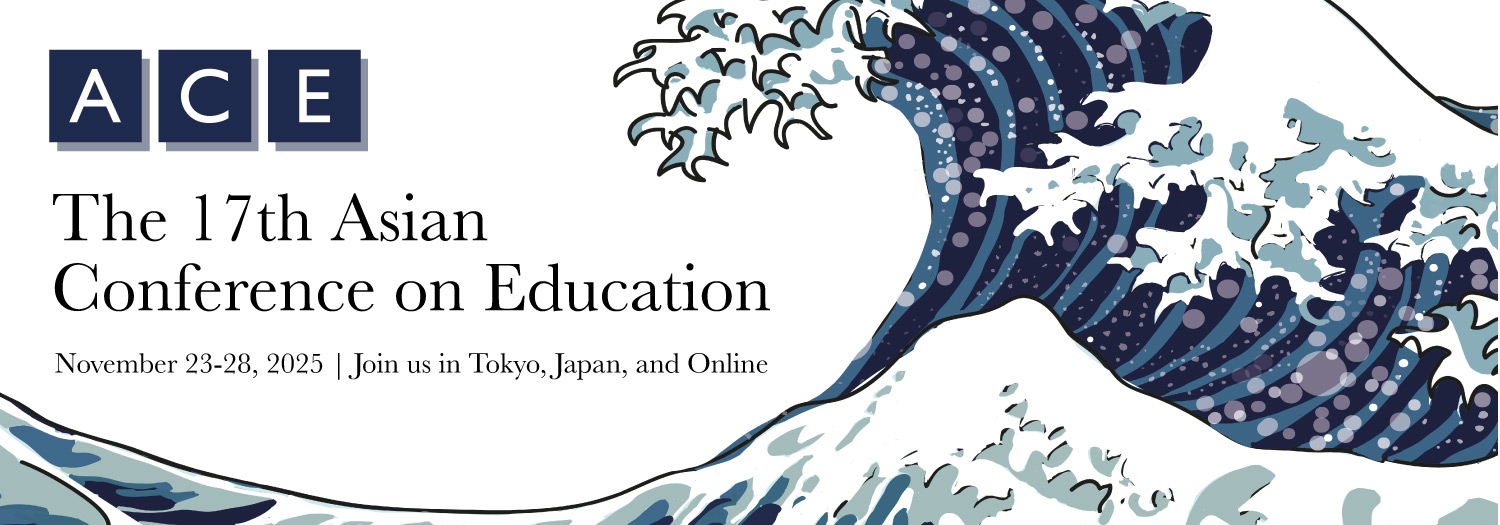“Education and Social Justice: Educating for Equality Within and Across Borders”
October 20–23, 2016 | Art Center Kobe, Kobe, Japan
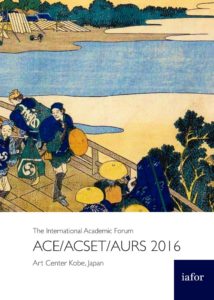 IAFOR promotes and facilitates new multifaceted approaches to one of the core issues of our time, namely globalisation and its many forms of growth and expansion. Awareness of how it cuts across the world of education, and its subsequent impact on societies, institutions and individuals, is a driving force in educational policies and practices across the globe. IAFOR’s Conferences on Education have these issues at their core. The conferences present those taking part with three unique dimensions of experience, encouraging interdisciplinary discussion, facilitating heightened intercultural awareness and promoting international exchange. In short, IAFOR’s Conferences on Education are about change, transformation and social justice. As IAFOR’s previous education conferences have shown, education has the power to transform and change whilst it is also continuously transformed and changed. The theme of education for social justice continues into 2016 in the Asian, European, Middle Eastern and North American Conferences on Education.
IAFOR promotes and facilitates new multifaceted approaches to one of the core issues of our time, namely globalisation and its many forms of growth and expansion. Awareness of how it cuts across the world of education, and its subsequent impact on societies, institutions and individuals, is a driving force in educational policies and practices across the globe. IAFOR’s Conferences on Education have these issues at their core. The conferences present those taking part with three unique dimensions of experience, encouraging interdisciplinary discussion, facilitating heightened intercultural awareness and promoting international exchange. In short, IAFOR’s Conferences on Education are about change, transformation and social justice. As IAFOR’s previous education conferences have shown, education has the power to transform and change whilst it is also continuously transformed and changed. The theme of education for social justice continues into 2016 in the Asian, European, Middle Eastern and North American Conferences on Education.
Globalised education systems are becoming increasingly socially, ethnically and culturally diverse. However, education is often defined through discourses embedded in Western paradigms as globalised education systems become increasingly determined by dominant knowledge economies, policies, practices and ideologies of education help define and determine ways in which social justice is perceived and acted out. What counts as ‘education’ and as ‘knowledge’ can appear incontestable but is in fact both contestable and partial. Discourses of learning and teaching regulate and normalise gendered and classed, racialised and ethnicised understandings of what learning is and who counts as a learner.
In many educational settings and contexts throughout the world, there remains an assumption that teachers are the possessors of knowledge which is to be imparted to students, and that this happens in neutral, impartial and objective ways. However, learning is about making meaning, and learners can experience the same teaching in very different ways. Students (as well as teachers) are part of complex social, cultural, political, ideological and personal circumstances, and current experiences of learning will depend in part on previous ones, as well as on age, gender, social class, culture, ethnicity, varying abilities and more.
IAFOR has five annual education conferences, exploring common themes in different ways to develop a shared research agenda which develops interdisciplinary discussion, heightens intercultural awareness and promotes international exchange.
Sub-themes:
- Educating through borders of power
- Transcending boundaries of ‘self’ and ‘other’
- Challenging and transcending learning spaces
- Education and the boundaries of communication
- Borderlands of being and becoming
ACE/ACSET Welcome Letter
Dear Colleagues,
Welcome to The Asian Conference on Education 2016 (ACE2016), The Asian Conference on Society, Education & Technology 2016 (ACSET2016) and The Asian Undergraduate Research Symposium 2016 (AURS2016). As in previous years, this core group of conferences in the IAFOR calendar will be held as part of the same event in the cosmopolitan city of Kobe.
Set in the industrial and cultural hub of the Kansai region, Kobe is a city with a colourful history that touches on the conference themes of social justice, educating for equality and using technology to transform systems and societies. From the reopening of its port to international trade in the nineteenth century and the European traders who started new lives here, to the rapid industrial development of the twentieth century, to the city’s spirited rebuild after the devastating Great Hanshin Earthquake of 1995, with the help of technology and industry Kobe has transformed itself, surviving periods of upheaval to mature into an economic and cultural centre with robust, diverse educational systems and a flourishing international scene.
We are pleased to welcome academics and practitioners presenting on a diverse range of topics relating to society, education and technology, and we encourage you to explore the challenges and opportunities for interdisciplinary engagement that these few days will offer.
On a sadder note, I am sorry to announce that the Chairman of IAFOR, the Reverend Professor Stuart D. B. Picken, passed away on Friday, 5 August, 2016. A man of great intellect and integrity, for the past seven years Stuart has been a wonderful colleague, an inspirational leader and a loyal friend.
I would like to thank the Conference Co-Chairs, Professor Michiko Nakano of Waseda University, Japan, Professor Keith W. Miller of The University of Missouri, USA, Professor Barbara Lockee of Virginia Tech, USA, and Professor Robert Logie of Osaka Gakuin University, Japan, as well as the many others who have given their time and expertise in preparation for this event. A special thanks also goes to Dr Bernard Montoneri, Spotlight Speaker and Editor of the IAFOR Journal of Education, for his ongoing contributions to IAFOR.
Lastly, my thanks to you all for making the journey to attend this IAFOR conference, and I hope you enjoy your time in the wonderful city of Kobe.
I look forward to to meeting you all over the coming days, and to the stimulating discussions and exchange of knowledge that will take place in this international academic forum.
Warm regards,
Dr Joseph Haldane
President, IAFOR
Speakers & Conference Chairs
Professor Joseph (José) McClanahan
Creighton University, USA
Featured Speaker & AURS2016 Conference Co-Chair
 Dr Joseph (José) McClanahan is an Associate Professor of Spanish and Associate Chair of the Department of Modern Languages and Literatures at Creighton University in Omaha, Nebraska. There, he teaches at all levels of the curriculum, including language and culture courses abroad. He has taught in both Latin America and in Spain. Recently, his research interests have focused on the area of teaching courses related to Languages for Special Purposes, in particular courses related to teaching Spanish to future Healthcare professionals. He also has a strong interest in curricular development and design that centers on new students entering the university. He has also led student educational trips to almost every continent on the globe.
Dr Joseph (José) McClanahan is an Associate Professor of Spanish and Associate Chair of the Department of Modern Languages and Literatures at Creighton University in Omaha, Nebraska. There, he teaches at all levels of the curriculum, including language and culture courses abroad. He has taught in both Latin America and in Spain. Recently, his research interests have focused on the area of teaching courses related to Languages for Special Purposes, in particular courses related to teaching Spanish to future Healthcare professionals. He also has a strong interest in curricular development and design that centers on new students entering the university. He has also led student educational trips to almost every continent on the globe.
Featured Presentation (2016) | “Educating for the Future – How Undergraduate Research Can and Does Provide Opportunity for Students to Succeed”
It is paramount that educators continue to adapt and develop new approaches that create equal opportunities for productive educational experiences for all students. One key way in which we can accomplish this goal is through collaborative research with undergraduate students. The sciences (biology, chemistry, or physics) have already had success in creating research programs for students. Yet, many outside of these traditional sciences may not fully grasp how they can incorporate students into their own research projects and what it means to work with undergraduates in their scholarship. Therefore, this presentation explores how faculty can include students in our research, help dissipate some of the commonly held myths about undergraduate students in research, and discover the benefits of this work for faculty and students.
Professor Insung Jung
International Christian University, Japan
Keynote Speaker
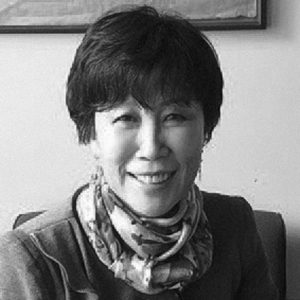 Insung Jung has been a professor of Education at the International Christian University in Japan since 2003. Before joining ICU, she served as the Director of the Multimedia Education Institute at Ewha Womans University in Korea. She is co-author and co-editor of several publications including Quality assurance and accreditation in distance education and e-learning: Models, policies and research (Routledge), Distance and blended learning in Asia (Routledge), Quality assurance in distance education and e-learning: Challenges and solutions from Asia (Sage), Online learner competencies: Knowledge, skills and attitudes for successful learning in online and blended settings (Information Age Publishing), Culture and online learning: Global perspectives and research (Stylus), and Liberal arts education and colleges in East Asia: Possibilities and challenges in the global age (Springer). Currently, she is serving as an advisor to the International Board of Standards for Training, Performance and Instruction (ibstpi); a co-editors-in-chief of the International Journal of Educational Media and Technology, a regional editor of the International Review of Research in Open and Distance Education (Athabasca University, Canada); an associate editor of International Journal of Distance Education Technologies (USA); an editorial board member of Distance Education (Australia), Asian Journal of Distance Education, Journal of Online Learning and Teaching (USA), and the Journal of Distance Learning (New Zealand); a critical friend of British Journal of Educational Technology (UK), and a reviewer of several other journals including Educational Technology Research & Development, Computers & Education, and Journal of Educational Technology & Society.
Insung Jung has been a professor of Education at the International Christian University in Japan since 2003. Before joining ICU, she served as the Director of the Multimedia Education Institute at Ewha Womans University in Korea. She is co-author and co-editor of several publications including Quality assurance and accreditation in distance education and e-learning: Models, policies and research (Routledge), Distance and blended learning in Asia (Routledge), Quality assurance in distance education and e-learning: Challenges and solutions from Asia (Sage), Online learner competencies: Knowledge, skills and attitudes for successful learning in online and blended settings (Information Age Publishing), Culture and online learning: Global perspectives and research (Stylus), and Liberal arts education and colleges in East Asia: Possibilities and challenges in the global age (Springer). Currently, she is serving as an advisor to the International Board of Standards for Training, Performance and Instruction (ibstpi); a co-editors-in-chief of the International Journal of Educational Media and Technology, a regional editor of the International Review of Research in Open and Distance Education (Athabasca University, Canada); an associate editor of International Journal of Distance Education Technologies (USA); an editorial board member of Distance Education (Australia), Asian Journal of Distance Education, Journal of Online Learning and Teaching (USA), and the Journal of Distance Learning (New Zealand); a critical friend of British Journal of Educational Technology (UK), and a reviewer of several other journals including Educational Technology Research & Development, Computers & Education, and Journal of Educational Technology & Society.
Keynote Presentation (2016) | “MOOCs: What we have learned”
Massive open online courses or MOOCs were predicted to achieve world domination and completely transformation of higher education. Today, these predictions are seen to have been overblown. But with several years of experience now behind them, MOOC providers and users are adjusting both their perceptions about online learning and the courses themselves. This presentation will examine the ways MOOCs are being used by individual learners and university systems, and their impact on access, quality and cost in higher education. It will conclude with lessons learned and explore emerging issues and what next.
ACSET2016 Conference Chair Panel
The Asian Conference on Society, Education & Technology 2016 invites educators and policy makers from around the world to look at the latest trends and issues in technology policy and practice and its role in the private and public sphere.
ACSET is a conference about change and transformation, and the conference theme of “Education and Social Justice: Educating for Equality within and across Borders” looks at how technology can transform and change systems and whole societies, whilst itself in a state of continuous transformation and change. Harnessed in the right way, technology can empower individuals to achieve great things and make the world a better place, but also raises many worrying ethical questions, including those concerning privacy and surveillance.
This panel will feature a discussion with Conference Chair Keith Miller and ACSET Keynote Speaker Insung Jung, facilitated by Professor Bethany Spielman.
Dr Peter McCagg
Akita International University, Japan
Keynote Speaker
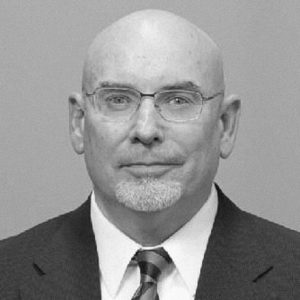 Dr McCagg is the Vice President for Academic Affairs of Akita International University (AIU), where he also serves as a member of the board of trustees. In his current position, he provides leadership for the faculty, who strive to make the University the best destination in Japan for international students to learn about this country, its people and language, and for Japanese students to prepare to become the global leaders that the founding president envisioned when he established AIU in 2004.
Dr McCagg is the Vice President for Academic Affairs of Akita International University (AIU), where he also serves as a member of the board of trustees. In his current position, he provides leadership for the faculty, who strive to make the University the best destination in Japan for international students to learn about this country, its people and language, and for Japanese students to prepare to become the global leaders that the founding president envisioned when he established AIU in 2004.
Prior to AIU, Dr McCagg worked for New York University as Clinical Professor of English and Director of The American Language Institute. He also taught for many years at International Christian University (ICU), where he served in various administrative assignments including Dean of International Affairs.For nearly forty years, Dr McCagg has dedicated his life to helping Japanese engage in responsible and meaningful ways with people from outside Japan, and to helping students from around the world successfully navigate life in Japan.
Featured Panel Presentation (2016) | "International Liberal Arts – Meeting Japan’s Higher Education Needs in the Global and Digital Era"
Scarcely into its second decade of existence, Akita International University (AIU) has become a model for how Japanese institutions of higher learning can better prepare students for making meaningful contributions to the wellbeing of the global community and the planet. When it comes to educational and social justice, to equality within and across borders, AIU aims to establish educational structures and incorporate learning activities that challenge not only students’ minds, but also their hearts—structures and activities designed to develop their capacity for understanding, caring about, and rising to the challenges of our complex times. In an age where human and digital networks define and facilitate ways of working together to address the world’s most pressing problems, AIU strives to use its global connections to link faculty and students with colleagues both locally and at a distance in face-to-face and digitally mediated intercultural project-based learning.
All this “aiming” and “designing” and “striving” may sound well and good, but this presentation angles less to promote AIU, than it seeks to reveal ways for all who share the lofty aspirations embodied in the conference’s 2016 theme to work toward their greater achievement. Through a critical analysis of AIU’s existing programs and curricular offerings, the speaker identifies dimensions of the university experience in Japan that can and need to be strengthened in order to create coherence and integrity in students’ intellectual experiences.
Dr Yvonne Masters
University of New England, Australia
Featured Speaker & AURS2016 Conference Co-Chair
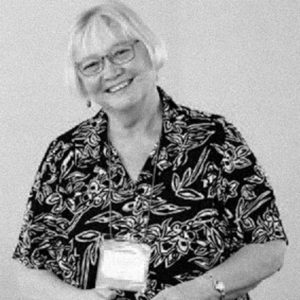 Dr Yvonne Masters is currently a Senior Lecturer in Professional Classroom Practice in the School of Education, University of New England (UNE), Armidale, Australia, a position that she accepted after five years as Director of Professional Experience in the same School. Prior to taking up her position at UNE Yvonne had 30 years’ experience in secondary schools including in the roles of Curriculum Coordinator, Deputy Principal and Principal, roles that developed her skills in leadership, project management, curriculum and assessment. Her teaching experience spans three Australian states. Yvonne’s research interests centre on teacher education, professional experience and virtual worlds, with a particular focus on distance education students. She has a keen interest in developing an understanding in pre-service teachers of the need for a caring and professional approach to teaching. Her goal is the development of teachers who respect their students and empower them in classrooms rather than dis-empowering them through punitive and unreasonable responses. Yvonne gained in 2010, in collaboration with other researchers, an Office of Learning and Teaching (OLT) grant entitled VirtualPREX Innovative assessment using a 3D virtual world with pre-service teachers, and at the end of 2014 received an OLT Seed Grant to develop resources to equip pre-service teachers for the new wave of virtual schools. Yvonne has written and co-written seven book chapters, two journal articles and presented six refereed conference papers in the last three years. While Yvonne is an active researcher and a teacher educator, her deep passion is providing school students with an engaging classroom where each student is respected for their own individuality and provided with an environment that facilitates their learning.
Dr Yvonne Masters is currently a Senior Lecturer in Professional Classroom Practice in the School of Education, University of New England (UNE), Armidale, Australia, a position that she accepted after five years as Director of Professional Experience in the same School. Prior to taking up her position at UNE Yvonne had 30 years’ experience in secondary schools including in the roles of Curriculum Coordinator, Deputy Principal and Principal, roles that developed her skills in leadership, project management, curriculum and assessment. Her teaching experience spans three Australian states. Yvonne’s research interests centre on teacher education, professional experience and virtual worlds, with a particular focus on distance education students. She has a keen interest in developing an understanding in pre-service teachers of the need for a caring and professional approach to teaching. Her goal is the development of teachers who respect their students and empower them in classrooms rather than dis-empowering them through punitive and unreasonable responses. Yvonne gained in 2010, in collaboration with other researchers, an Office of Learning and Teaching (OLT) grant entitled VirtualPREX Innovative assessment using a 3D virtual world with pre-service teachers, and at the end of 2014 received an OLT Seed Grant to develop resources to equip pre-service teachers for the new wave of virtual schools. Yvonne has written and co-written seven book chapters, two journal articles and presented six refereed conference papers in the last three years. While Yvonne is an active researcher and a teacher educator, her deep passion is providing school students with an engaging classroom where each student is respected for their own individuality and provided with an environment that facilitates their learning.
Spotlight Presentation: Quality or Elitism? Whither (or Wither) Equality in Teacher Education?
Quality teachers are important. Accepting this as a given, there is ongoing debate about what ‘quality’ means and how it is achieved. In Australia, as elsewhere in the world, the debate continues and governments continue to promote a range of measures purportedly designed to improve quality. Such measures include higher entrance scores for university, aptitude tests, and literacy and numeracy entrance and exit tests. In the world of increasingly measurable accountability it is time to consider that numbers may not tell the whole story. ‘Equality’, and more importantly ‘equity’, transcend the borders of numerical accountability, recognising that students are not all the same, that they all have different needs and that they do not all begin from a level playing fields In Australian teacher education there is an impetus to stop the enrolment of a range of students who have pursued different pathways to teacher education including mature age students and early entry students. With the shift to enrolments based only on high entrance scores there is also a lack of equity for a range of other students whom research has shown to achieve at lower levels: rural students, non-English speaking background students, indigenous students and students with special needs. This paper examines the possible impact of the move to entrance score only acceptance into teacher education courses and draws on a range of examples demonstrating that equity in acceptance does not impede quality in the emerging teachers.
Featured Presentation (2016) | “‘I have presented my research’: an ending or a beginning?”
Research is not a rarefied activity that only takes place in universities and/or laboratories, nor is it a one-off event. Presenting to others is not only for conferences, nor is it the end of a journey. Moving forward, whether to postgraduate work at a university or taking on a career, there is still an expectation that thoughts and ideas can be eloquently presented to others.
There is also an element of research in most occupations. This presentation explores possible beginnings for future consideration.
Professor Grant Black
University of Tsukuba, Japan
Featured Symposium Chair
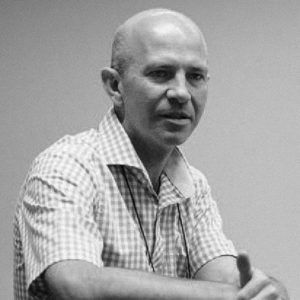 Grant Black is an associate professor in the program for Modern Languages and Cultures, Faculty of Humanities and Social Sciences at the University of Tsukuba, an adjunct lecturer in the Faculty of Commerce at Chuo University, and a consultant for intercultural and business management. He has an MA in East Asian Languages and Cultures from the University of California, Los Angeles. He previously worked in international operations for small and medium-sized enterprises (SMEs) and in intercultural training. Currently, he is completing a doctoral research project with the Centre for Labour Market Studies, School of Management at the University of Leicester. His research interests are in youth-to-work transition, CQ (intercultural intelligence) and global management skills.
Grant Black is an associate professor in the program for Modern Languages and Cultures, Faculty of Humanities and Social Sciences at the University of Tsukuba, an adjunct lecturer in the Faculty of Commerce at Chuo University, and a consultant for intercultural and business management. He has an MA in East Asian Languages and Cultures from the University of California, Los Angeles. He previously worked in international operations for small and medium-sized enterprises (SMEs) and in intercultural training. Currently, he is completing a doctoral research project with the Centre for Labour Market Studies, School of Management at the University of Leicester. His research interests are in youth-to-work transition, CQ (intercultural intelligence) and global management skills.
Professor Fumiko Kurihara
Chuo University, Japan
Featured Symposium Discussant
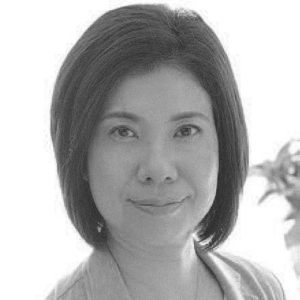 Fumiko Kurihara is a Professor at the Faculty of Commerce, Chuo University. She received an MA in TESOL from Georgetown University, and a PhD in English Language Education from International Christian University. She has taught EFL (English as a foreign language), intercultural communication, linguistics, and SLA (second language acquisition) at various universities in Japan. Her current research interests are intercultural approach to language learning, global citizenship education, and CLIL (content and language integrated learning).
Fumiko Kurihara is a Professor at the Faculty of Commerce, Chuo University. She received an MA in TESOL from Georgetown University, and a PhD in English Language Education from International Christian University. She has taught EFL (English as a foreign language), intercultural communication, linguistics, and SLA (second language acquisition) at various universities in Japan. Her current research interests are intercultural approach to language learning, global citizenship education, and CLIL (content and language integrated learning).
Professor Reiko Yamada
Doshisha University, Japan
Featured Speaker
 Reiko Yamada is Professor of Faculty of Social Studies and Director of Center for Higher Education and Student Research at Doshisha University, Kyoto, Japan. She has long been interested in the comparative higher education policy in OECD countries. More recently, she has conducted the quantitative study for student development and is engaged in the comparative student research between Japan, Korea and the United States. Dr Yamada served as the Director of the Center for the Faculty of Development and Assistant Academic Provost at Doshisha University between 2013-2015. She serves as a member of the committee of the National University Corporation Evaluation Commission in Japan. She is the author of For the Quality Assurance of Undergraduate Education (Toshindo, 2012). She is also editor of Comparative Analysis of Learning Assessment (Toshindo, 2010). Her recent publications include Measuring Quality of Undergraduate Education in Japan (Ed. R. Yamada).(2014).). She was the first president of Japanese Association of First Year Experience.
Reiko Yamada is Professor of Faculty of Social Studies and Director of Center for Higher Education and Student Research at Doshisha University, Kyoto, Japan. She has long been interested in the comparative higher education policy in OECD countries. More recently, she has conducted the quantitative study for student development and is engaged in the comparative student research between Japan, Korea and the United States. Dr Yamada served as the Director of the Center for the Faculty of Development and Assistant Academic Provost at Doshisha University between 2013-2015. She serves as a member of the committee of the National University Corporation Evaluation Commission in Japan. She is the author of For the Quality Assurance of Undergraduate Education (Toshindo, 2012). She is also editor of Comparative Analysis of Learning Assessment (Toshindo, 2010). Her recent publications include Measuring Quality of Undergraduate Education in Japan (Ed. R. Yamada).(2014).). She was the first president of Japanese Association of First Year Experience.
Featured Symposium Presentation (2016) | “Structural Transformation of Japanese Higher Education: The Process of Campus Internationalization in the Globalization Era”
Higher Education on a global basis is now facing a great issue. These factors are associated with one common phenomenon exemplified as globalization and its impact. Serious competition as a result of globalization urges Japanese universities to transform themselves to cope with a knowledge-based society. Thus, transfer of knowledge and human personnel in a knowledge-based society is regarded as synonymous with internationalization. Japanese universities are obliged to deal with upgrading excellence in research as well as teaching and learning in more global context. However, not only Japan but also the rest of the world is struggling to adjust to global developments in higher education. This paper will analyze the government policy change of higher education in recent years and some case studies of higher education institutions. Many developments characterize global competition in higher education institutions in Japan, and I would like to focus on some of these developments, including (1) the internationalization of universities, such as development world campus plan in the framework of partnership with higher education institutions in other countries, (2) how Japanese universities have transformed their departments to adapt to challenges to the international movement. Then, the paper will show the case study of Doshisha University; how she has transformed in order to deal with the international movement. Although, the second focal point is more domestically analyzed and refects the local environment in Japan, it will explore how the structure of departments of Japanese higher education was affected by the government policy direction.
Professor Yasuo Nakatani
Hosei University, Japan
Featured Speaker
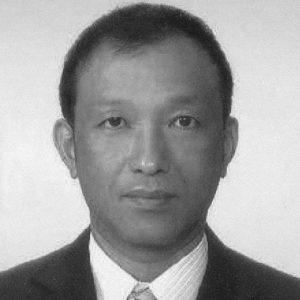 Yasuo Nakatani is a Professor of the Faculty of Economics at Hosei University. He received his PhD from the University of Birmingham and was a visiting scholar at Oxford University. His research interests are Second Language Acquisition, Academic Writing and Business Communication. He published a number of research articles regarding Communication Strategies in international Journals such as The Modern language Journal (MLJ). He is a coauthor of Language Learner Strategies: Thirty years of Research and Practice from Oxford University Press and has published several books such as Improving Oral Proficiency through Strategy Training, and Global Leadership: Case Studies of Business Leaders in Japan. He is a reviewer of MLJ, TESOL Quarterly, System, Language Learning and Journal of Pragmatics.
Yasuo Nakatani is a Professor of the Faculty of Economics at Hosei University. He received his PhD from the University of Birmingham and was a visiting scholar at Oxford University. His research interests are Second Language Acquisition, Academic Writing and Business Communication. He published a number of research articles regarding Communication Strategies in international Journals such as The Modern language Journal (MLJ). He is a coauthor of Language Learner Strategies: Thirty years of Research and Practice from Oxford University Press and has published several books such as Improving Oral Proficiency through Strategy Training, and Global Leadership: Case Studies of Business Leaders in Japan. He is a reviewer of MLJ, TESOL Quarterly, System, Language Learning and Journal of Pragmatics.
Featured Symposium Presentation (2016) | “Global Education with Business-Academia Collaboration”
An important goal of higher education is to research and write a decent thesis. To achieve this, learners should read substantial books to define significance of research territory, and develop critical thinking and problem solving skills. However, it is not easy to motivate them to complete demanding tasks merely at classrooms and libraries. This paper presents a unique example of global education at a seminar (GES), which helps students improve academic skills. GES enhances learner strategies by project-based learning (PBL) with business-academia collaboration. GES consists of three stages; role-model learning, overseas projects, and thesis writing. First, students meet with social leaders inspiring and encouraging them to strive for greatness, such as the Vice President of Coca-Cola Japan, and the ex-CEO of Toshiba Vietnam. When understating industries and preparing for Q & A sessions, students are supposed to read many books with critical thinking and find relevant research topics. Secondly, they take part in PBL by visiting Asian countries and investigating local operations of companies like Coca-Cola and Toshiba. They also visit foreign universities to discuss social issues, and conduct interviews and questionnaires with students there. After finishing the projects, they report findings and present new business ideas at company headquarters. Finally, having feedback from business executives on their projects, students start writing theses with the obtained data and propose new research niches. They use the academic writing textbook based on corpus analysis dealing with 200 academic papers. Through GES, students can develop strong motivation for continuing active learning.
Dr Maria Gabriela Schmidt
University of Tsukuba, Japan
Featured Speaker
 Dr Maria Gabriela Schmidt is currently an Associate Professor of German as a Foreign Language at the Center for Education of Global Communication, University of Tsukuba (Japan). Born in Stuttgart, Germany, Dr Schmidt was educated at Mainz University (Germany) and graduated with an MA in Philosophy. Just after graduation, the first six years of her academic career started as an assistant lecturer for General and Comparative Linguistics at Mainz University, before going to teach German Philology at Dankook-University in Seoul (South-Korea) for 3 years. Continuing her linguistic research, she gained a PhD degree in Comparative Linguistics from Mainz University. She has 18 years teaching experience at university level for German as Foreign Language and Linguistics in Japan. Dr Schmidt’s research is focused on applied linguistics and teaching methodology. She is currently an active member in the Japanese Association of Language Teaching.
Dr Maria Gabriela Schmidt is currently an Associate Professor of German as a Foreign Language at the Center for Education of Global Communication, University of Tsukuba (Japan). Born in Stuttgart, Germany, Dr Schmidt was educated at Mainz University (Germany) and graduated with an MA in Philosophy. Just after graduation, the first six years of her academic career started as an assistant lecturer for General and Comparative Linguistics at Mainz University, before going to teach German Philology at Dankook-University in Seoul (South-Korea) for 3 years. Continuing her linguistic research, she gained a PhD degree in Comparative Linguistics from Mainz University. She has 18 years teaching experience at university level for German as Foreign Language and Linguistics in Japan. Dr Schmidt’s research is focused on applied linguistics and teaching methodology. She is currently an active member in the Japanese Association of Language Teaching.
Featured Symposium Presentation (2016) | “Reaching out and turning halfway - Foreign language education policies and effects of the CEFR”
The attitude towards foreign language education in Japan concerning the Common European Framework of Reference (hereafter: CEFR) and other frameworks and standards at university levels can be used as an indicator for addressing the needs of the globalisation process. This contribution will exemplify this process using case studies of CEFR implementations on a scale of successful and not so successful approaches and implementations. The critical evaluation will be done in the field of foreign language teaching and the efforts to achieve a more communicative language teaching resulting in a visible outcome the so-called communicative skills. The analysis of several implementations will show immanent criteria which should be considered further in the ongoing discussion on globalisation in Japan at university level.
Dr Yukiko Mishina
University of Tokyo, Japan
Featured Speaker
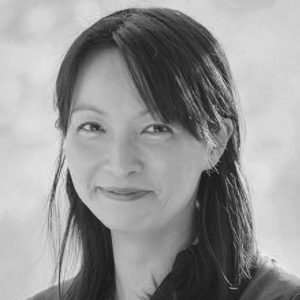 Dr Yukiko Mishina is currently an Assistant Professor at the University of Tokyo and teaches in the ALESS Program in the Centre for Global Communication Strategies in Tokyo, Japan. She graduated with a BS, MS, and PhD in Chemistry from The University of Chicago in Chicago, Illinois, USA. Her scientific research interests include metalloproteins and optogenetics. She is also interested in English language education and global higher education and research.
Dr Yukiko Mishina is currently an Assistant Professor at the University of Tokyo and teaches in the ALESS Program in the Centre for Global Communication Strategies in Tokyo, Japan. She graduated with a BS, MS, and PhD in Chemistry from The University of Chicago in Chicago, Illinois, USA. Her scientific research interests include metalloproteins and optogenetics. She is also interested in English language education and global higher education and research.
Featured Symposium Presentation (2016) | “Globalization and the Japanese Liberal Arts Education System”
In the contemporary globalized age, universities face pressure on various levels, constantly catering to the needs of local students and adjusting to function as an elite-level international institution. To meet current demands, there has recently been an effort among universities to stress globally-focused endeavors, leading to an expansion of programs and centers at universities in Japan that offer an increased number of English language courses and international exchange opportunities. Implicit within this expansion is a larger aim of providing students with flexibility, sensitivity, and openness towards diverse cultural perspectives. Although these initiatives appeared more prominently with globalization efforts, they also resemble the more established framework of a liberal arts education. Drawing on my own liberal arts education in the US as well as my experiences in teaching English at the Centre for Global Communication Strategies at The University of Tokyo, the relationship between liberal arts education and globalization will be examined.
Specifically, this paper will discuss some key differences in global outlook and globalization at the curriculum level; a greater emphasis placed upon English education in the Japanese context, compared to the scholarly and cultural aims of a US liberal arts education to develop broader general knowledge and intellectual capacities. This distinction indicates that the concept of globalization is itself not globalized; it is instead understood and practiced differently across geographical and institutional contexts. This observation highlights the need to establish mutual understandings about the meaning of globalization, given the current prominence of this term in university policy decision-making.
Dr Patrick Lo
University of Tsukuba, Japan
Featured Seminar Co-Presenter
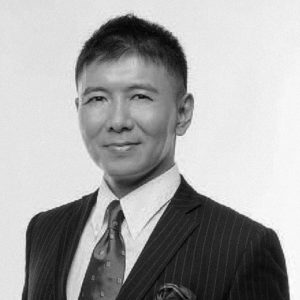 Dr Patrick Lo is currently serving as Associate Professor at the Faculty of Library, Information & Media Science, the University of Tsukuba in Japan. He earned his Doctor of Education from the University of Bristol (U.K.), and has a Master of Arts in Design Management from the Hong Kong Polytechnic University, a Master of Library & Information Science from McGill University (Canada), and a Bachelor of Fine Arts from Mount Allison University (Canada). He also took part in a one-year academic exchange at the University of Tubingen in Germany from 1990–91. He is efficient in Chinese (both Cantonese and Putonghua), English and German.
Dr Patrick Lo is currently serving as Associate Professor at the Faculty of Library, Information & Media Science, the University of Tsukuba in Japan. He earned his Doctor of Education from the University of Bristol (U.K.), and has a Master of Arts in Design Management from the Hong Kong Polytechnic University, a Master of Library & Information Science from McGill University (Canada), and a Bachelor of Fine Arts from Mount Allison University (Canada). He also took part in a one-year academic exchange at the University of Tubingen in Germany from 1990–91. He is efficient in Chinese (both Cantonese and Putonghua), English and German.
Dr Patrick Lo has presented about 100 research papers and project reports focusing on librarianship, humanities, and education at different local and international workgroup meetings, seminars, conferences, etc., including: Mainland China, Hong Kong, Austria, France, Germany, Italy, Japan, Korea, Turkey, United States, and Sweden, and at institutions including the Library of Congress (U.S.), Austrian National Library (Vienna), University of Vienna, National Library of France (Paris), National Institute of Informatics (Japan), Konrad-Zuse-Center for Information Technology (Berlin), etc.
His research interests and areas of specialty include: comparative studies in library and information science (LIS); art and design librarianship and information literacy.
Featured Symposium Co-Presentation (2016) | “Inside the World’s Major East Asian Collections - Conversations with the World’s Leading East Asian Librarians, Archivists, and Curators”
We examine the rise of the “LAM,” an acronym that stands for libraries, archives, and museums and in doing so, we profile leading experts – librarians, archivists, and museum curators – who specialize in East Asian collections from across the world. In examining the dynamically shifting role of the cultural institution in the context of managing information and collections, our research provides important themes offered by these cultural experts in understanding the necessary professional skills, knowledge, and personalities that are required for working in such environments of varying size, scope, and composition in LAMs.
Interviewing practicing librarians, archivists, and museum curators across the world who specialize in East Asian collections, Inside the World’s Major East Asian Collections examines the shifting role of the cultural institution in the context of managing information, cultural and knowledge exchanges, and collaboration on a global scale and ultimately challenges the notion of what constitutes “East Asia’s collections.”
These managers of East Asia collections not only refer to library, archive, and museum (LAM) professionals who are ethnically of East Asian descent, but also their North American and European colleagues, who have devoted their careers to safeguarding cultural heritage collections of immeasurable values that are housed in different world’s leading LAMs, located all over the globe. That is why we went on a journey to interview experts from Berlin State Library, Bavarian State Library, the British Library, the British Museum, the National Library of France, the Vatican Library, the National Library of Denmark, the National Archives of Japan, the National Taiwan Library – just to name a few.
Dr Dickson Chiu
University of Hong Kong, Hong Kong
Featured Seminar Co-Presenter
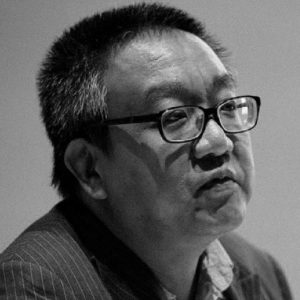 Dickson K.W. Chiu received the B.Sc. (Hons.) degree in Computer Studies from the University of Hong Kong in 1987. He received the M.Sc. (1994) and the PhD (2000) degrees in Computer Science from the Hong Kong University of Science and Technology (HKUST). He started his own computer company while studying part-time. He is now teaching at the University of Hong Kong and has also taught at several universities in Hong Kong. His research interest is in library and information management with a cross-disciplinary approach, involving workflows, software engineering, information technologies, management, security, and databases. The results have been widely published in around 200 papers in international journals and conference proceedings (most of them have been indexed by SCI, SCI-E, EI, and SSCI), including many practical master and undergraduate project results. He received a best paper award in the 37th Hawaii International Conference on System Sciences in 2004. He is the founding Editor-in-chief of the International Journal on Systems and Service-Oriented Engineering and the EAI Endorsed Transaction on e-Business. He also serves on the editorial boards of several international journals. He co-founded several international workshops and co-edited several journal special issues. He also served as a program committee member for over 100 international conferences and workshops. He is a Senior Member of both the ACM and the IEEE, and a life member of the Hong Kong Computer Society.
Dickson K.W. Chiu received the B.Sc. (Hons.) degree in Computer Studies from the University of Hong Kong in 1987. He received the M.Sc. (1994) and the PhD (2000) degrees in Computer Science from the Hong Kong University of Science and Technology (HKUST). He started his own computer company while studying part-time. He is now teaching at the University of Hong Kong and has also taught at several universities in Hong Kong. His research interest is in library and information management with a cross-disciplinary approach, involving workflows, software engineering, information technologies, management, security, and databases. The results have been widely published in around 200 papers in international journals and conference proceedings (most of them have been indexed by SCI, SCI-E, EI, and SSCI), including many practical master and undergraduate project results. He received a best paper award in the 37th Hawaii International Conference on System Sciences in 2004. He is the founding Editor-in-chief of the International Journal on Systems and Service-Oriented Engineering and the EAI Endorsed Transaction on e-Business. He also serves on the editorial boards of several international journals. He co-founded several international workshops and co-edited several journal special issues. He also served as a program committee member for over 100 international conferences and workshops. He is a Senior Member of both the ACM and the IEEE, and a life member of the Hong Kong Computer Society.
Featured Symposium Co-Presentation (2016) | “Inside the World’s Major East Asian Collections - Conversations with the World’s Leading East Asian Librarians, Archivists, and Curators”
We examine the rise of the “LAM,” an acronym that stands for libraries, archives, and museums and in doing so, we profile leading experts – librarians, archivists, and museum curators – who specialize in East Asian collections from across the world. In examining the dynamically shifting role of the cultural institution in the context of managing information and collections, our research provides important themes offered by these cultural experts in understanding the necessary professional skills, knowledge, and personalities that are required for working in such environments of varying size, scope, and composition in LAMs.
Interviewing practicing librarians, archivists, and museum curators across the world who specialize in East Asian collections, Inside the World’s Major East Asian Collections examines the shifting role of the cultural institution in the context of managing information, cultural and knowledge exchanges, and collaboration on a global scale and ultimately challenges the notion of what constitutes “East Asia’s collections.”
These managers of East Asia collections not only refer to library, archive, and museum (LAM) professionals who are ethnically of East Asian descent, but also their North American and European colleagues, who have devoted their careers to safeguarding cultural heritage collections of immeasurable values that are housed in different world’s leading LAMs, located all over the globe. That is why we went on a journey to interview experts from Berlin State Library, Bavarian State Library, the British Library, the British Museum, the National Library of France, the Vatican Library, the National Library of Denmark, the National Archives of Japan, the National Taiwan Library – just to name a few.
Professor Bernard Montoneri
Tamkang University, Taiwan
Spotlight Speaker
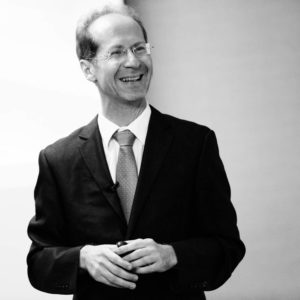 Bernard Montoneri is the co-founder of the IAFOR Journal of Education. He earned his PhD (African, Arab, and Asian Words; History, Languages, Literature) and his BA in Chinese from the University of Provence, Aix-Marseille I, France. He taught Literature (European, Children, American, and British) and languages (French, English, and Italian) at Providence University for 16 years. He is currently an Associate Professor at Tamkang University, French Department, Taiwan. Bernard has around 40 publications, including journal papers (including SSCI, SCI, and THCI), conference papers, and books and has obtained many teaching and research projects. His research interests include French literature, children literature, English writing, automated scoring systems, teaching and learning evaluation, data envelopment analysis, networking, and teaching methods. He is a reviewer for top academic journals such as Review of Educational Research (ranked #1 in Education), American Educational Research Journal, Teaching and Teacher Education, and European journal of Operational Research.
Bernard Montoneri is the co-founder of the IAFOR Journal of Education. He earned his PhD (African, Arab, and Asian Words; History, Languages, Literature) and his BA in Chinese from the University of Provence, Aix-Marseille I, France. He taught Literature (European, Children, American, and British) and languages (French, English, and Italian) at Providence University for 16 years. He is currently an Associate Professor at Tamkang University, French Department, Taiwan. Bernard has around 40 publications, including journal papers (including SSCI, SCI, and THCI), conference papers, and books and has obtained many teaching and research projects. His research interests include French literature, children literature, English writing, automated scoring systems, teaching and learning evaluation, data envelopment analysis, networking, and teaching methods. He is a reviewer for top academic journals such as Review of Educational Research (ranked #1 in Education), American Educational Research Journal, Teaching and Teacher Education, and European journal of Operational Research.
Spotlight Presentation (2016) | “Impact of Posting Teaching Content Online in a French Course for Beginners”
Nowadays, a growing number of instructors use information and communications technology (ICT) inside and outside the classroom to teach all kind of courses, including language courses. The instructor used a traditional way of teaching (lecturing, text-book, conversation, no technology in the classroom, no social network) during the first semester of academic year 2013-2014 (September-January) in a French course for beginners in a Taiwan public university. During the second semester (February-June 2014), the teacher added the use of multimedia and Facebook to teach to the same students. They joined a Facebook learning group, which they could access anytime during the second semester; they could notably post, view posts, like, and comment in French and sometimes English (no Chinese). This study analyzes data from the first and second semester to measure students' learning progress and how the group might increase or not, their motivation and change in their behavior. Students were expected not only to improve their reading and writing skills, but to increase their knowledge of French culture.
Professor Bethany Spielman
Southern Illinois University, USA
Featured Panellist
 Bethany Spielman, JD, PhD, MHA, is Professor of Medical Humanities in the School of Medicine and is cross-appointed in the School of Law. Her scholarly publications, which bridge bioethics and law, include two books and more than a hundred articles that have been cited by The New York Times, the Institute of Medicine, the Irish government and numerous scholars. She is Editor-in-Chief of the journal Medicolegal and Bioethics and is a contributor to the Encyclopedia of Applied Ethics.
Bethany Spielman, JD, PhD, MHA, is Professor of Medical Humanities in the School of Medicine and is cross-appointed in the School of Law. Her scholarly publications, which bridge bioethics and law, include two books and more than a hundred articles that have been cited by The New York Times, the Institute of Medicine, the Irish government and numerous scholars. She is Editor-in-Chief of the journal Medicolegal and Bioethics and is a contributor to the Encyclopedia of Applied Ethics.
Her current research projects, in collaboration with Memorial Hospital’s Clinical Ethics Center, focus on racial bias in clinical ethics consultation and on repeat ethics consultations. Dr Spielman teaches the law and ethics of human subjects research; physicians and human rights; law, religion and health care; ethics in a short white coat, and the social responsibilities of scientists. She enjoys spending time with her husband and two sons, painting, yoga, chi walking, swimming, and the trails and visual and performing arts of Door County, WI.
ACSET 2016 Conference Chair Panel
The Asian Conference on Society, Education & Technology 2016 invites educators and policy makers from around the world to look at the latest trends and issues in technology policy and practice and its role in the private and public sphere.
ACSET is a conference about change and transformation, and the conference theme of “Education and Social Justice: Educating for Equality within and across Borders” looks at how technology can transform and change systems and whole societies, whilst itself in a state of continuous transformation and change. Harnessed in the right way, technology can empower individuals to achieve great things and make the world a better place, but also raises many worrying ethical questions, including those concerning privacy and surveillance.
This panel will feature a discussion with Conference Chair Keith Miller and ACSET Keynote Speaker Insung Jung, facilitated by Professor Bethany Spielman.
Professor Keith W. Miller
The University of Missouri, USA
Featured Panellist & ACSET2016 Conference Chair
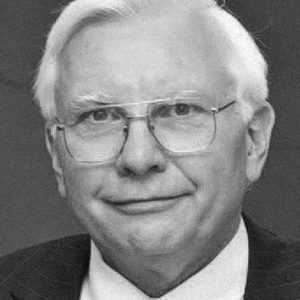 Keith W. Miller is the Orthwein Endowed Professor for Lifelong Learning in the Sciences at the University of Missouri – St. Louis. In that position, he is partnering with the St. Louis Science Centert. Dr Miller’s research interests are in software testing and in computer ethics, and he is a past editor of the editor-in-chief of IEEE Technology and Society Magazine. He was awarded the 2011 Joseph Weizenbaum Award by the International Society for Ethics and Information Technology. He is the principal investigator of a recent grant from the U.S. National Science Foundation to study the effects of ethics education for computer science students.
Keith W. Miller is the Orthwein Endowed Professor for Lifelong Learning in the Sciences at the University of Missouri – St. Louis. In that position, he is partnering with the St. Louis Science Centert. Dr Miller’s research interests are in software testing and in computer ethics, and he is a past editor of the editor-in-chief of IEEE Technology and Society Magazine. He was awarded the 2011 Joseph Weizenbaum Award by the International Society for Ethics and Information Technology. He is the principal investigator of a recent grant from the U.S. National Science Foundation to study the effects of ethics education for computer science students.
ACSET 2016 Conference Chair Panel
The Asian Conference on Society, Education & Technology 2016 invites educators and policy makers from around the world to look at the latest trends and issues in technology policy and practice and its role in the private and public sphere.
ACSET is a conference about change and transformation, and the conference theme of “Education and Social Justice: Educating for Equality within and across Borders” looks at how technology can transform and change systems and whole societies, whilst itself in a state of continuous transformation and change. Harnessed in the right way, technology can empower individuals to achieve great things and make the world a better place, but also raises many worrying ethical questions, including those concerning privacy and surveillance.
This panel will feature a discussion with Conference Chair Keith Miller and ACSET Keynote Speaker Insung Jung, facilitated by Professor Bethany Spielman.
Professor James Briganti
Nagasaki University School of Medicine, Japan
Spotlight Presenter
 Professor Briganti is currently Assistant Professor at Nagasaki University School of Medicine, Japan, where he teaches Public Health in the English Section and oversees three different international exchange programs. Previously, Professor Briganti worked for Michigan State University, USA, teaching academic writing to VIPP (Visiting International Professional Program) students from Libya, Saudi Arabia and Kuwait, among others. After graduating with a Bachelor’s degree in Political Science, International Relations, from James Madison College at Michigan State University, Professor Briganti was active in two citizens’ lobby groups, Clean Water Action and Citizens Action, where he was a fundraiser and crew leader responsible for educating citizens state-wide concerning legislative actions on environmental and civil liberties issues. Professor Briganti returned to Japan five years ago after obtaining his Master's degree. His current interests are cross-cultural competence, social justice, international academic collaboration, and Content-Based Instruction. He has an abiding love of literature, learning, nature and progressive ideas.
Professor Briganti is currently Assistant Professor at Nagasaki University School of Medicine, Japan, where he teaches Public Health in the English Section and oversees three different international exchange programs. Previously, Professor Briganti worked for Michigan State University, USA, teaching academic writing to VIPP (Visiting International Professional Program) students from Libya, Saudi Arabia and Kuwait, among others. After graduating with a Bachelor’s degree in Political Science, International Relations, from James Madison College at Michigan State University, Professor Briganti was active in two citizens’ lobby groups, Clean Water Action and Citizens Action, where he was a fundraiser and crew leader responsible for educating citizens state-wide concerning legislative actions on environmental and civil liberties issues. Professor Briganti returned to Japan five years ago after obtaining his Master's degree. His current interests are cross-cultural competence, social justice, international academic collaboration, and Content-Based Instruction. He has an abiding love of literature, learning, nature and progressive ideas.
Spotlight Presentation (2016) | “Minding the Gap – Confronting the Standardized Testing Mindset in Higher Education”
Teaching to the test has become standard practice in Japan. The uniformity of instruction that this approach requires, as well as the apparent fairness of everyone being judged by the same standard, fits well within the parameters of conformity and equality that are hallmarks of Japanese society. Learners raised on this system become very comfortable with rote memorization and test-taking strategies. Those who excel in this system are on track to join the professional classes as lawyers, business leaders, and doctors.
In practical medical training at university level, however, complex, interacting variables in individuals and in populations as a whole confound this approach. ‘Answers’ are not simply a matter of black and white, of simple memorization, but rather the product of evolving knowledge of specific, interconnected, phenomena. The stark limitations of the 'standard' approach to learning are revealed through the ‘gaps’ students exhibit in their lack of prior knowledge, or presupposed misinformation.
During this discussion I will present some of the ‘gaps’ that learners have revealed through their exposure to a variety of public health issues and some methods undertaken to broaden the critical thinking skills of learners.
'Gaps' in critical (scientific) methodology that will be touched on include: confirmation bias, cherry-picking studies, equating published study with scientific 'truth', and disinformation though cultural/national mythology.
Professor Robyn Gibson
University of Sydney, Australia
Spotlight Presenter
 Associate Professor Robyn Gibson is Associate Dean of Student Experience in the Faculty of Education and Social Work at the University of Sydney. A former primary teacher and art/craft specialist, Robyn currently lectures in Visual and Creative Arts Education in both the Bachelor of Education (Primary) and Master of Teaching (Primary) programmes. Her academic research – which utilises interdisciplinary methodologies such as arts-informed inquiry and art/o/graphy – concerns creativity and creative teaching, and art as research/ research as art, particularly the connection between clothes and memory. The latter resulted in the publication of The Memory of Clothes in 2015. Robyn is passionate about the central and critical role the Arts can play in lifelong learning.
Associate Professor Robyn Gibson is Associate Dean of Student Experience in the Faculty of Education and Social Work at the University of Sydney. A former primary teacher and art/craft specialist, Robyn currently lectures in Visual and Creative Arts Education in both the Bachelor of Education (Primary) and Master of Teaching (Primary) programmes. Her academic research – which utilises interdisciplinary methodologies such as arts-informed inquiry and art/o/graphy – concerns creativity and creative teaching, and art as research/ research as art, particularly the connection between clothes and memory. The latter resulted in the publication of The Memory of Clothes in 2015. Robyn is passionate about the central and critical role the Arts can play in lifelong learning.
Spotlight Co-Presentation (2016) | “How Do We Become Socially Just Beings Through the Arts?”
Australia has a long history of engagement with the Arts, from the original indigenous people of the land through to more recent refugees and asylum seekers crossing our borders. And while arts education is mandatory in all Australian states and territories, policies and practices remain contested. The introduction of an Australian National Curriculum in visual arts, music, drama, dance and media arts is an opportunity for all students to express and represent ideas and experiences whilst developing and displaying empathy for multiple viewpoints.
The Arts contribute to the development of confident and creative individuals, nurturing and challenging active and informed citizens. This presentation argues that the Arts have the power to transform and change. Arts education at its core helps to "define and determine ways in which social justice is perceived and acted out”. How we prepare our students as socially just beings through arts education is thus illustrated through examples of innovative artistic practices and ideologies currently taking place in educational contexts across Australia, including the Confined Hearts Project and the School Drama Program in conjunction with Sydney Theatre Company and the Sydney Story Factory.
Dr Marianne Hulsbosch
University of Sydney, Australia
Spotlight Presenter
 Dr Marianne Hulsbosch is a Senior Lecturer in Visual Art & Design Education at the University of Sydney. She has extensive experience lecturing in visual arts, design, technology and textiles education at national and international levels. Dr Hulsbosch explored identity construction through sartorial means for her PhD in Creative Arts. She publishes widely and her most recent titles are: Pointy Shoes and Pith Helmets (2014), Leiden: Brill; Art & Me: Senior Visual Arts Stage 6 (2014) and Art & Me: Teacher Resource Package (2014), Melbourne: Cambridge University Press. Dr Hulsbosch has extensive experience in developing curriculum support material for teachers in art-based learning and teaching. Her current research interest is in the development of visual literacy in multicultural contexts. In addition, she continues to exhibit in internationally acclaimed exhibitions that incorporate a wide range of processes, materials and contextual sites.
Dr Marianne Hulsbosch is a Senior Lecturer in Visual Art & Design Education at the University of Sydney. She has extensive experience lecturing in visual arts, design, technology and textiles education at national and international levels. Dr Hulsbosch explored identity construction through sartorial means for her PhD in Creative Arts. She publishes widely and her most recent titles are: Pointy Shoes and Pith Helmets (2014), Leiden: Brill; Art & Me: Senior Visual Arts Stage 6 (2014) and Art & Me: Teacher Resource Package (2014), Melbourne: Cambridge University Press. Dr Hulsbosch has extensive experience in developing curriculum support material for teachers in art-based learning and teaching. Her current research interest is in the development of visual literacy in multicultural contexts. In addition, she continues to exhibit in internationally acclaimed exhibitions that incorporate a wide range of processes, materials and contextual sites.
Spotlight Co-Presentation (2016) | “How Do We Become Socially Just Beings Through the Arts?”
Australia has a long history of engagement with the Arts, from the original indigenous people of the land through to more recent refugees and asylum seekers crossing our borders. And while arts education is mandatory in all Australian states and territories, policies and practices remain contested. The introduction of an Australian National Curriculum in visual arts, music, drama, dance and media arts is an opportunity for all students to express and represent ideas and experiences whilst developing and displaying empathy for multiple viewpoints.
The Arts contribute to the development of confident and creative individuals, nurturing and challenging active and informed citizens. This presentation argues that the Arts have the power to transform and change. Arts education at its core helps to "define and determine ways in which social justice is perceived and acted out”. How we prepare our students as socially just beings through arts education is thus illustrated through examples of innovative artistic practices and ideologies currently taking place in educational contexts across Australia, including the Confined Hearts Project and the School Drama Program in conjunction with Sydney Theatre Company and the Sydney Story Factory.
Dr Monty P. Satiadarma
Tarumanagara University, Indonesia
Spotlight Presenter
 Dr Satiadarma is a clinical psychologist who has been teaching psychology at Tarumanagara University, Indonesia, since 1994. He was one of the founders of the Department of Psychology at Tarumanagara, as well as the Dean of Psychology, Vice Rector and Rector of the university. He graduated with a degree in psychology from the University of Indonesia, art therapy from Emporia State, US, family counselling from Notre Dame de Namur, US, and clinical hypnotherapy from Irvine, US. He has nationally published a number of books with a particular interest in educational psychology, and in music and art therapy – methods with which he treated survivors of the Indonesian tsunami on behalf of the International Red Cross and the United Nations. He is a board member and area chair of the International Council of Psychology, and a founder and board member of the Asian Psychology Association.
Dr Satiadarma is a clinical psychologist who has been teaching psychology at Tarumanagara University, Indonesia, since 1994. He was one of the founders of the Department of Psychology at Tarumanagara, as well as the Dean of Psychology, Vice Rector and Rector of the university. He graduated with a degree in psychology from the University of Indonesia, art therapy from Emporia State, US, family counselling from Notre Dame de Namur, US, and clinical hypnotherapy from Irvine, US. He has nationally published a number of books with a particular interest in educational psychology, and in music and art therapy – methods with which he treated survivors of the Indonesian tsunami on behalf of the International Red Cross and the United Nations. He is a board member and area chair of the International Council of Psychology, and a founder and board member of the Asian Psychology Association.
Spotlight Presentation (2016) | “Using Storytelling to Teach Morality in Education”
Other than playing activities, children tend to be interested in listening to stories. Many stories can be utilized to teach children to learn a number of moral principles. The story of Pinocchio, for example, teaches children to learn to not tell lies. The story of Puss in Boots teaches children to learn to accept sharing and not to become too demanding, besides teaches children to learn to nurture and care for life. Different versions of similar stories exist in various countries. However, recent society tends to publish more stories about war and heroism. Super heroes that represent powers are more attractive to the public, including children, adolescents and adults, than stories about patience and resilience. Films and computer games tend to emphasize the importance of power and authority rather than nurturance, caring and resilience. This presentation emphasizes the importance of the utilization of stories for children’s moral education as an approach to developing the personalities of the children of the future.
